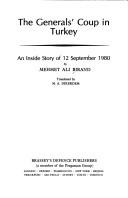| Listing 1 - 10 of 65 | << page >> |
Sort by
|
Book
Year: 1976 Publisher: Sherbrooke, Qué. : Naaman,
Abstract | Keywords | Export | Availability | Bookmark
 Loading...
Loading...Choose an application
- Reference Manager
- EndNote
- RefWorks (Direct export to RefWorks)
AFRIQUE --- VIOLENCE POLITIQUE --- COUP D'ETAT --- COUP D'ETAT --- AFRIQUE --- VIOLENCE POLITIQUE --- COUP D'ETAT --- COUP D'ETAT
Book
Publisher: Paris : Bernard Grasset.
Abstract | Keywords | Export | Availability | Bookmark
 Loading...
Loading...Choose an application
- Reference Manager
- EndNote
- RefWorks (Direct export to RefWorks)
VIOLENCE POLITIQUE --- REVOLUTION --- COUP D'ETAT --- REVOLUTION --- VIOLENCE POLITIQUE --- REVOLUTION --- COUP D'ETAT --- REVOLUTION --- COUP D'ETAT
Book
Year: 1943 Publisher: New York, NY : Brentano's,
Abstract | Keywords | Export | Availability | Bookmark
 Loading...
Loading...Choose an application
- Reference Manager
- EndNote
- RefWorks (Direct export to RefWorks)
Violence politique --- Revolution --- Coup d'etat --- Revolution --- Violence politique --- Revolution --- Coup d'etat --- Revolution --- Coup d'etat
Book
Year: 1949 Publisher: Paris : Plon,
Abstract | Keywords | Export | Availability | Bookmark
 Loading...
Loading...Choose an application
- Reference Manager
- EndNote
- RefWorks (Direct export to RefWorks)
Book
Year: 1969 Publisher: Paris : Gallimard,
Abstract | Keywords | Export | Availability | Bookmark
 Loading...
Loading...Choose an application
- Reference Manager
- EndNote
- RefWorks (Direct export to RefWorks)
VIOLENCE POLITIQUE --- COUP D'ETAT --- TERRORISME --- ORDRE PUBLIC --- COUP D'ETAT --- VIOLENCE POLITIQUE --- COUP D'ETAT --- TERRORISME --- ORDRE PUBLIC --- COUP D'ETAT
Book
ISBN: 9782271086549 Year: 2016 Publisher: Paris : CNRS Editions,
Abstract | Keywords | Export | Availability | Bookmark
 Loading...
Loading...Choose an application
- Reference Manager
- EndNote
- RefWorks (Direct export to RefWorks)
Ce livre présente une étude originale et complète d’un événement pourtant fréquemment étudié : le coup d’État du 2 décembre 1851, organisé par Louis Napoléon Bonaparte contre les institutions républicaines dont il était le premier président élu au suffrage universel masculin. Une étude originale parce qu’à la différence de celles qui l’ont précédée, elle ne se limite pas aux organisateurs du coup, le Prince-Président, Morny et Maupas. Elle décrit en effet l’opération et sa contestation dans son ampleur nationale, avec la diversité des situations provinciales. Longtemps ignorés, les relais locaux sont au cœur du travail de Patrick Lagoueyte qui restitue leur action : préfets, militaires, magistrats, etc.Une étude complète car elle ne s’intéresse pas seulement aux journées du coup d’État, mais s’étend aux premiers mois qui le suivent. Débordant d’initiatives, le futur Napoléon III jette alors les bases d’une dictature destinée à éradiquer l’opposition républicaine.Marquée par un recul politique et par une justice d’exception, cette époque est aussi celle d’une accélération de l’entrée de la France dans l’ère de la communication et de la modernité.
Napoléon --- France --- France -- 1851 (Coup d'État) --- History --- Histoire
Book
Year: 1981 Publisher: London : Institute for the Study of Conflict,
Abstract | Keywords | Export | Availability | Bookmark
 Loading...
Loading...Choose an application
- Reference Manager
- EndNote
- RefWorks (Direct export to RefWorks)

ISBN: 008034741X Year: 1987 Publisher: London : Brassey's Defence Publications,
Abstract | Keywords | Export | Availability | Bookmark
 Loading...
Loading...Choose an application
- Reference Manager
- EndNote
- RefWorks (Direct export to RefWorks)
Book
ISBN: 1316120600 1316121690 1316133680 1316132595 131613041X 1107429757 1139875973 1316128237 1316131505 1316129322 1107076064 1322293295 9781107076068 9781316129326 9781316130414 9781316131503 Year: 2015 Publisher: Cambridge
Abstract | Keywords | Export | Availability | Bookmark
 Loading...
Loading...Choose an application
- Reference Manager
- EndNote
- RefWorks (Direct export to RefWorks)
Ali Rahnema's work is a meticulous historical reconstruction of the Iranian coup d'état in 1953 that led to the overthrow of Mohammed Mosaddeq and his government. Mosaddeq's removal from power has probably attracted more attention than any other event occurring during his tenure because of the role of foreign involvement; the political, economic and social impact on Iran and the long-term impact the ousting had on Iran-US relations. Drawing on American, British and Iranian sources, Rahnema closely examines the four-day period between the first failed coup and the second successful attempt, investigating in fine detail how the two coups were conceptualised, rationalised and executed by players on both the Anglo-American and Iranian sides. Through painstaking research into little-studied sources, Rahnema casts new light on how a small group of highly influential pro-Britain politicians and power brokers revisited the realities on the ground with the CIA operatives dispatched to Iran and how they recalibrated a new, and ultimately successful, operational plan.
Book
Year: 2008 Publisher: Bruxelles Néon rouge
Abstract | Keywords | Export | Availability | Bookmark
 Loading...
Loading...Choose an application
- Reference Manager
- EndNote
- RefWorks (Direct export to RefWorks)
Chile --- History --- Coup d'état, 1973 --- Personal narratives --- Personal narratives
| Listing 1 - 10 of 65 | << page >> |
Sort by
|

 Search
Search Feedback
Feedback About UniCat
About UniCat  Help
Help News
News